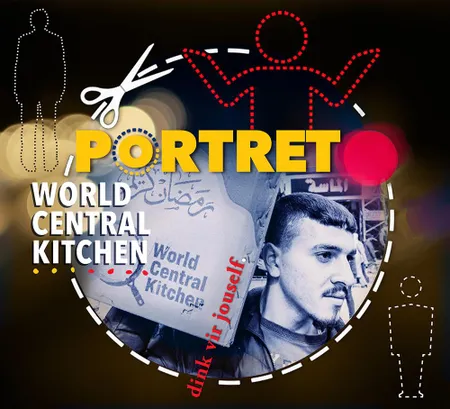THINK of World Central Kitchen (WCK) as a kind of Chefs Without Borders, similar to organisations like Médecins Sans Frontières for medics or Reporters Sans Frontières for journalists.
Spanish-American chef and restaurateur José Andrés started WCK in 2010 when he helped set up kitchens and distribute food in Haiti after an earthquake. He was already an internationally known chef with award-winning restaurants in several US cities, and the founder of the Global Food Institute at George Washington University. WCK has won several humanitarian prizes for its work in feeding the hungry after natural or other disasters.
After Haiti, WCK did similar work in Texas (Hurricane Harvey) and Puerto Rico (the catastrophic Hurricane Maria), and today it is active from Australia and the Bahamas to Egypt, Lebanon and Ukraine — and, since Hamas's October 7 attack on Israel last year, in Gaza. It operates culinary training programmes in Cambodia, the Dominican Republic, Nicaragua, Zambia and Peru, among others.
Lees hierdie artikel in Afrikaans:
People travel from all over the world to work for WCK and they know how dangerous it can be; at least one volunteer has died in the war in Ukraine.
But on Monday, seven WCK people were killed in an Israeli airstrike in Gaza. A missile hit their convoy while it was driving from Rafah to Gaza City after overseeing the unloading of 100 tons of food shipped to the enclave.
Three of the seven killed were British members of WCK's security team, the others were relief workers: an Australian woman, a Polish man, an American-Canadian man and a Palestinian man.
In response to the killings, WCK ceased all its operations in Gaza. And Andrés is furious. He does not accept Israel's explanation that the attack was unintended or that the Israel Defence Forces did not know who the target was.
He told Reuters the Israeli missiles targeted the convoy of WCK vehicles “systematically, car by car". The vehicles were clearly marked with large WCK emblems, including on the roof, and the Israeli military were well aware of his people's movements, Andrés said. “It wasn't just an unfortunate case of ‘Oops, we dropped the bomb in the wrong place'."
Andrés is used to clashing with authorities who think his people are in the way or don't always follow the official bureaucratic channels, but it's the first time there's been a possibility that a civilian aid organisation like WCK may have been specifically targeted, even though Israel vehemently denies this.
In Puerto Rico in 2017, WCK got involved while the US Federal Emergency Management Agency was still struggling to properly understand the situation. It served more than two million meals to residents in the first month of being there. WCK regularly provides meals to immigrants at the US-Mexico border, and Andrés (an immigrant from Spain) has taken on Donald Trump numerous times about what he has had to say about the new arrivals.
Why does WCK so often succeed where other organisations fail? Andrés says it's because it focuses only on food. When it is needed, it sends in a skilled team who know how to prepare healthy and tasty food on a large scale and quickly, with little money. “When you talk about food and water, people don't want a solution a week from now or a month from now. The solution has to be now."
In Gaza, WCK recently managed to get food supplies shipped out of Cyprus in collaboration with the Spanish organisation Open Arms, and it estimates that it has already provided more than 43 million meals to Palestinians. It has set up large kitchens in the southern city of Rafah and the central town of Deir al-Balah, and they support 68 community kitchens that provide more than 170,000 hot meals daily. During Ramadan, which began on March 10, WCK has handed out 92,000 boxes of food containing about 4.7 million meals.
But after this week's events, all that work is in jeopardy. This could be especially disastrous in northern Gaza, where people could start perishing from hunger on a large scale. Some food supplies even had to be taken back to Cyprus because it is not clear how they can be distributed without WCK. The floating pier that the US has undertaken to build with WCK's mediation so that supplies can be delivered to Gaza by sea may also be in jeopardy.
Yet Israel continues to deny that there are food shortages in Gaza, blaming the UN and aid groups like WCK for their failure to distribute more.
All of this must surely make Americans suspicious of Israel's agenda. What's the point of the US aiding organisations like WCK in feeding the people of Gaza if Israel continues to make things harder for them to do so, and on top of that while using American missiles and other weaponry?
One of those who share this suspicion is Mick Mulroy, a former US deputy assistant secretary of defence for the Middle East. When asked about the seven WCK employees who were killed, Mulroy told the BBC: “There should be an investigation to determine why a clearly marked vehicle whose movement was coordinated was struck in the daytime by what appears to be a precision weapon. That shouldn't happen."
♦ VWB ♦
BE PART OF THE CONVERSATION: Go to the bottom of this page to share your opinion. We look forward to hearing from you.




To comment on this article, register (it's fast and free) or log in.
First read Vrye Weekblad's Comment Policy before commenting.